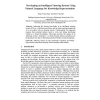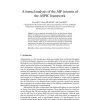1676 search results - page 13 / 336 » Formal Development of Self-organising Systems |
IANDC
2011
13 years 3 months ago
2011
Partial transition systems support abstract model checking of complex temporal propercombining both over- and under-approximatingabstractions into a single model. Over the years, ...
ITS
2010
Springer
13 years 10 months ago
2010
Springer
Authoring the domain knowledge of an intelligent tutoring system (ITS) is a well-known problem, and an often-mentioned approach is to use authors who are domain experts. Unfortunat...
COLING
2010
13 years 3 months ago
2010
Lexicalized Well-Founded Grammar (LWFG) is a recently developed syntacticsemantic grammar formalism for deep language understanding, which balances expressiveness with provable le...
COMMA
2010
13 years 3 months ago
2010
In order to support the interchange of ideas and data between different projects and applications in the area of computational argumentation, a common ontology for computational ar...
FASE
1999
Springer
14 years 1 months ago
1999
Springer
JTN is a formal graphic notation for Java-targeted design speci cations, that are speci cations of systems that will be implemented using Java. JTN is aimed to be a part of a more ...


